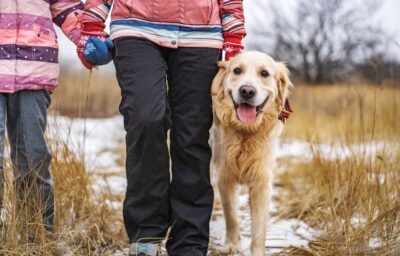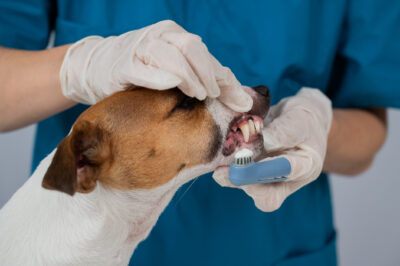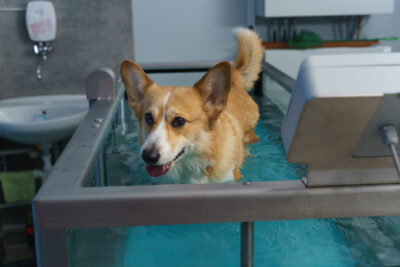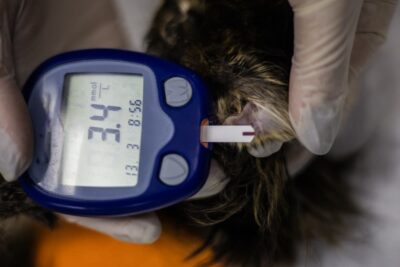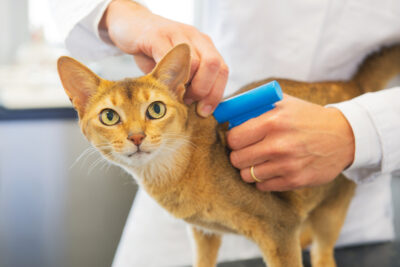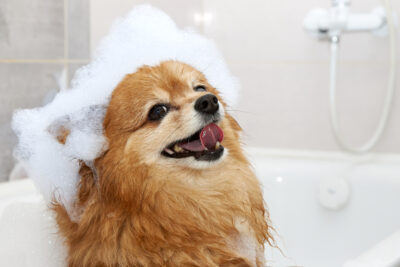7 Holiday Hazards for Pets (and How to Avoid Them)
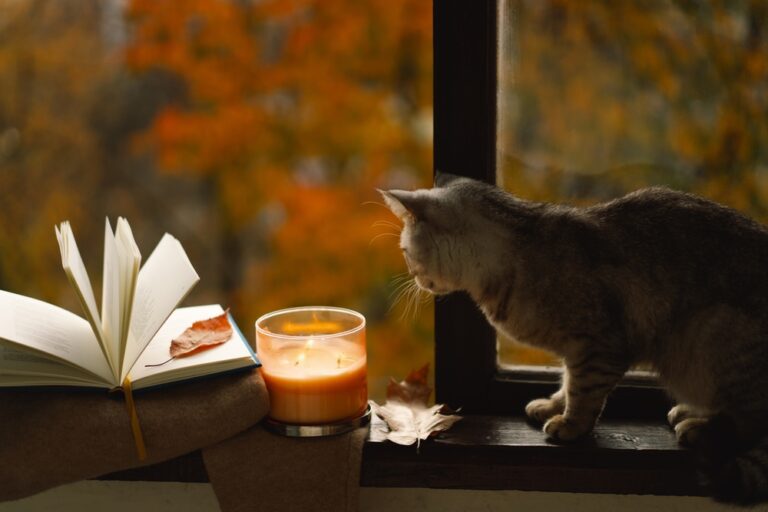
The holiday season is a time filled with food, family, friends — and lots of possible holiday hazards for pets.
“It’s a busy time and pets may be confused or excited by what is going on and we may be less attentive than usual,” says Brian Collins, DVM, DABVP (Canine and Feline Practice), senior lecturer at Cornell University College of Veterinary Medicine.
“It can also be a fun time for pets if we keep their safety in mind while including them in the festivities wherever possible,” Dr. Collins adds.
Preparing ahead of time for holiday pet safety can help put you and your family at ease and help avoid pet emergencies during this special time of year.
7 Holiday Hazards for Pets to Avoid
Unfortunately, there are many holiday hazards for pets that could harm your four-legged friend. Keep an eye out for the following potential risks to keep your pet safe and sound as you celebrate.
1. Candles
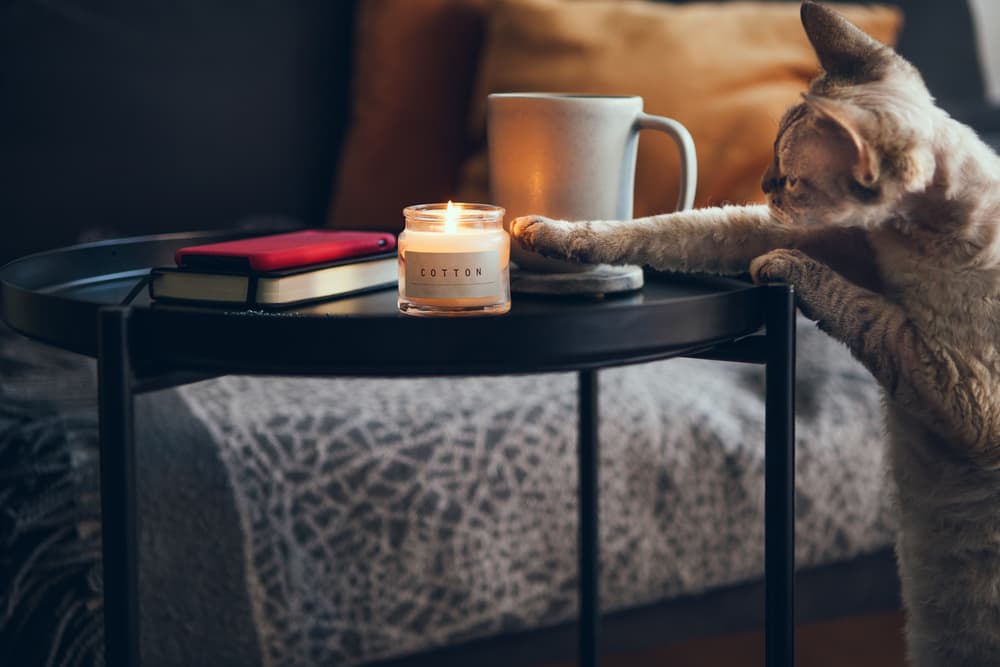
Candles can create a warm and peaceful ambiance in your home during the holidays — but they are dangerous for pets.
“Candles may be part of holiday decorations or religious celebrations,” Dr. Collins says. “Candles can get knocked over by a curious cat or a dog’s happy tail, causing either injury to them as well as a potential fire hazard.”
How to avoid a mishap: If your pet is drawn to candles, you might play it safe and go with artificial candle options.
“If using real candles, keep them out of the reach of pets or keep the pets separated in the house from where the candles are being used,” Dr. Collins says. “Consider safer options such as battery-operated, flameless candles or other decorations. Always be sure to have a functional fire extinguisher in your home.”
2. Seasonal stress and anxiety

The holidays are a bustling time and can increase stress and anxiety for your pets.
“Holiday chaos, loud noises, and unfamiliar guests can heighten anxiety and stress in pets, potentially leading to issues such as destructive behavior, hiding, or even attempts to escape,” says Erin Askeland, CPDT-KA, CBCC-KA, animal health and behavior expert at Camp Bow Wow. “Pets left alone for longer periods of time or more frequently than usual may also experience stress due to these changes in their routine.”
How to avoid a mishap: Create a safe, calm environment for your pet, and consider using calming aids.
“Some dogs will do better being by themselves in a quiet room away from the festivities, perhaps even with a crate for security if they are accustomed to that,” Dr. Collins says. “Some pets may benefit from medication to keep them calm and relaxed. Consult with your veterinarian ahead of time so there’s plenty of time to prepare.”
3. Chocolate

Chocolate finds a place in almost any holiday celebration, but it is incredibly dangerous to dogs and cats.
“Chocolate contains theobromine and caffeine, which people can metabolize well but not so for cats and dogs,” Dr. Collins says. “Ingestion of a harmful quantity can lead to mild symptoms, such as an upset stomach and restlessness, to more serious symptoms, such as heart problems, seizures, and even death. Accidental ingestion is more common in dogs than in cats because it is more appealing to dogs overall, but both dogs and cats can suffer from chocolate toxicity.”
How to avoid a mishap: Be super careful to keep chocolate-containing treats out of your pets’ reach.
“Keep the chocolate out of reach — whether it is chocolate candy or baked into cookies, cakes, brownies, etc.,” Dr. Collins says. “Advise guests of the risks and monitor children closely who may innocently want to share their Halloween candy with the family dog. Pets may find chocolate in coat pockets, handbags, or wrapped up as a gift. If you have pets, be sure to ask if a gift is edible before you put it under the tree or leave it within a pet’s reach.”
4. Toxic plants and flowers

There are many holiday plants and flowers that may be toxic to your pets.
“Popular holiday plants such as poinsettias, mistletoe, and holly can be toxic to dogs and cats if ingested and may cause symptoms ranging from mild gastrointestinal distress to more severe issues like heart problems or even death,” Askeland says. “Plant foods and fertilizers can also be detrimental to a pet’s health.”
How to avoid a mishap: Do your research ahead of time before you bring any plants or flowers into your home or before you give them as a gift to people with pets.
“Cats are experts at reaching anything that you try to put out of their reach. With some plants such as lilies, there’s no point in taking the risk, as ingestion of any part of the plant can be fatal,” Dr. Collins says. “If you are sending flowers to someone, please ask the florist to avoid any that are not safe with pets. The ASPCA Animal Poison Control Center contains extensive lists that classify plants as either non-toxic or toxic.”
Askeland offers another piece of advice: “Consider using artificial versions of these plants to still achieve the festive look without the risk, though you still need to make sure pets aren’t chewing or eating these alternative options.”
5. High-fat or toxic foods

If your pets get a hold of leftovers, it can be dangerous if they feast on table scraps — especially if the foods are high in fat.
“Overconsumption of food in general or ingestion of dangerous food items can lead to many undesired consequences,” Dr. Collins says. “Dogs and cats generally have relatively stable diets, so if they consume unfamiliar food, it can lead to mild gastrointestinal (GI) distress, such as vomiting and diarrhea, and an even more serious condition such as pancreatitis. This is especially likely with food that contains high-fat content (like meat, gravy, and cheese).”
In addition, certain human foods can be toxic to dogs and cats.
“Some food may contain an artificial sweetener called xylitol, which can have fatal consequences if ingested by dogs,” Dr. Collins says. “Ingestion of bones can lead to blockages or perforations of the GI tract. Food cooked with onions is toxic. Raisins and grapes can be life-threatening to both cats and dogs. Corn cobs are very appealing to dogs, but eating them often leads to GI obstructions.”
How to avoid a mishap: Don’t leave pets unattended when food is out on the table or counter and properly store food when you are finished eating.
“Try to prevent accidental ingestion by keeping food out of your pet’s reach — which can be difficult if you have a large dog that can reach the counter or a cat who is able to jump that high,” Dr. Collins says. “Ask guests not to offer unapproved table food to pets. Trash should also be secured to prevent pets from feasting on it.”
6. Christmas trees

Your glimmering tree may be pretty to look at, but for curious pets, it’s a prime target for climbing, chewing, and destruction.
“Christmas trees pose multiple hazards,” Askeland says. “Pine needles can cause gastrointestinal blockages or perforations, tinsel, and ornaments can be choking hazards, and electrical cords for lights can lead to severe electric shocks if chewed.”
How to avoid a mishap: Take proactive measures to make your Christmas tree more pet-friendly.
“Secure your tree to prevent it from tipping over, use pet-friendly decorations, and cover electrical cords,” Askeland says. “Always supervise pets around the tree or consider using a baby gate to limit their access.”
7. Cold weather and antifreeze

Winter climates come with exposure threats, as well as possible ingestion of antifreeze.
“Cold weather brings its own challenges, including the risk of hypothermia and frostbite,” Askeland says. “Additionally, antifreeze spills can be extremely toxic; even a small amount ingested can be fatal.”
How to avoid a mishap: Protect your pet from extreme temperatures and keep them away from antifreeze products.
“Limit your dog’s exposure to cold weather and always clean up antifreeze spills immediately,” Askeland says. “Use pet-safe antifreeze products and ensure your dog has a warm, dry place to stay inside.”
If you have a cat who likes to roam outdoors, take steps to keep them warm and safe in winter, such as providing access to an enclosed space away from the elements and ensuring their water bowl doesn’t freeze over.
Holiday Pet Safety: Other Ways to Protect Your Pet

As a pet parent, there are many ways you can implement holiday pet safety tips to keep your dog and cat safe. Here are some additional tips for avoiding a holiday mishap.
Use pet identification tools
If your pet escapes by accident amid the holiday festivities, pet identification tags and tools can help you relocate them.
“Be sure your pet is identified in at least one way — an ID tag on a collar/harness and/or a microchip,” Dr. Collins says. “If people will be coming and going with doors opening a lot, it may be best to keep cats and dogs confined to a closed room so that the risk of escape is minimized.”
Ask guests to leave their pets at home
Unless your own pet is welcoming and friendly toward other pets, introducing a new pet during a holiday get-together can create a stressful environment for your pet.
“If guests ask to bring their pet with them, it may not be the best time to do so for the first time during holiday activities,” Dr. Collins says.
Have emergency information handy
Your family veterinarian’s office is likely closed overnight, as well as on weekends and holidays. In case of emergency, have the proper phone numbers and addresses for emergency pet services readily available.
“Know ahead of time where to take your pet if there is an emergency — especially if you are traveling with them,” Dr. Collins says. “If you have any doubts about your pet’s health, call a vet as soon as possible. The ASPCA Animal Poison Control Center hotline is a very valuable source of information.”
Brush up on training
Consider taking a training class or workshop with your pet to brush up on skills before guests come over and do your best to stick to your pet’s routine so they are still getting the exercise and mental stimulation they need. This can also help decrease stress in the hustle and bustle of the holiday season.
You may also consider pet day care or boarding options that can provide fun activities for your pet outside your home to keep them occupied and out of harm’s way.
